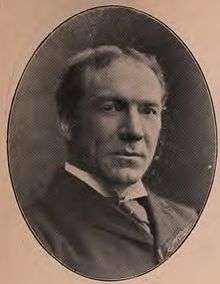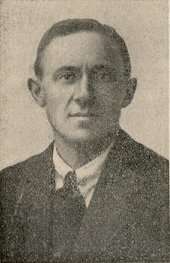Linlithgowshire (UK Parliament constituency)
For the pre-1707 constituency, see Linlithgowshire (Parliament of Scotland constituency). For the 1983–2005 constituency, see Linlithgow (UK Parliament constituency). For the 1999-onwards Scottish Parliament constituency, see Linlithgow (Scottish Parliament constituency).
| Linlithgowshire | |
|---|---|
|
Former County constituency for the House of Commons | |
| Subdivisions of Scotland | Linlithgowshire |
| 1708–1950 | |
| Number of members | One |
| Replaced by | West Lothian |
Linlithgowshire was a county constituency of the House of Commons of the Parliament of the United Kingdom from 1708 to 1950. It elected one Member of Parliament (MP) by the first past the post voting system.
For the 1950 general election, the constituency was renamed West Lothian.
Members of Parliament
| Election | Member | Party | |
|---|---|---|---|
| 1708 | Lord Johnstone | ||
| 1708 | John Houstoun | ||
| 1713 | Sir James Carmichael | ||
| 1714 | John Houstoun | ||
| 1715 | Sir James Cunynghame | ||
| 1722 | George Dundas | ||
| 1727 | Alexander Hamilton | ||
| 1741 | George Dundas | ||
| 1743 | Charles Hope-Weir | ||
| 1768 | John Hope | ||
| 1770 | James Dundas | ||
| 1774 | Sir William Cunynghame | ||
| 1790 | John Hope | ||
| 1800 | Sir Alexander Hope | ||
| 1835 | James Hope | ||
| 1838 | Charles Hope | ||
| 1845 | William Baillie | ||
| 1847 | George Dundas | ||
| 1859 | Charles Baillie | ||
| 1859 | Walter Ferrier Hamilton | ||
| 1865 | Peter McLagan | Liberal | |
| 1893 | Thomas Hope | Conservative | |
| 1895 | Alexander Ure | Liberal | |
| 1913 | John Pratt | Liberal | |
| 1918 | James Kidd | Coalition Conservative | |
| 1922 | Manny Shinwell | Labour | |
| 1924 | James Kidd | Unionist | |
| 1928 | Manny Shinwell | Labour | |
| 1931 | Sir Adrian William Maxwell Baillie | Unionist | |
| 1935 | George Mathers | Labour | |
| 1945 | constituency abolished | ||
Election results
Elections in the 1880s
| Party | Candidate | Votes | % | ± | |
|---|---|---|---|---|---|
| Liberal | Peter McLagan | 3,801 | 70.3 | ||
| Conservative | Thomas Hope | 1,606 | 29.7 | n/a | |
| Majority | 2,195 | 40.6 | |||
| Turnout | 79.4 | ||||
| Liberal win (new seat) | |||||
| Party | Candidate | Votes | % | ± | |
|---|---|---|---|---|---|
| Liberal | Peter McLagan | 2,543 | 58.4 | -11.9 | |
| Conservative | Thomas Hope | 1,810 | 41.6 | +11.9 | |
| Majority | 733 | 16.8 | -23.8 | ||
| Turnout | 63.9 | ||||
| Liberal hold | Swing | -11.9 | |||
Elections in the 1890s
| Party | Candidate | Votes | % | ± | |
|---|---|---|---|---|---|
| Liberal | Peter McLagan | 2,870 | 51.4 | ||
| Conservative | Thomas Hope | 2,709 | 48.6 | ||
| Majority | 161 | 2.8 | |||
| Turnout | 79.2 | ||||
| Liberal hold | Swing | ||||
| Party | Candidate | Votes | % | ± | |
|---|---|---|---|---|---|
| Conservative | Thomas Hope | 3,240 | 51.3 | +2.7 | |
| Liberal | Alexander Ure | 3,071 | 48.7 | -2.7 | |
| Majority | 169 | 2.6 | 5.4 | ||
| Turnout | 86.3 | +7.1 | |||
| Conservative gain from Liberal | Swing | +2.7 | |||

Ure
| Party | Candidate | Votes | % | ± | |
|---|---|---|---|---|---|
| Liberal | Alexander Ure | 3,760 | 54.4 | ||
| Conservative | Thomas Hope | 3,153 | 45.6 | ||
| Majority | 607 | 8.8 | |||
| Turnout | 88.4 | ||||
| Liberal gain from Conservative | Swing | ||||
Elections in the 1900s
| Party | Candidate | Votes | % | ± | |
|---|---|---|---|---|---|
| Liberal | Alexander Ure | 3,827 | 55.8 | ||
| Conservative | David Dundas | 3,034 | 44.2 | ||
| Majority | 793 | 11.6 | |||
| Turnout | 81.2 | ||||
| Liberal hold | Swing | ||||

Ure
| Party | Candidate | Votes | % | ± | |
|---|---|---|---|---|---|
| Liberal | Alexander Ure | 5,282 | 65.7 | ||
| Conservative | Patrick Rose-Innes | 2,761 | 34.3 | ||
| Majority | 2,521 | 31.4 | |||
| Turnout | 78.1 | ||||
| Liberal hold | Swing | ||||
Elections in the 1910s
| Party | Candidate | Votes | % | ± | |
|---|---|---|---|---|---|
| Liberal | Rt Hon. Alexander Ure | 6,451 | 64.6 | -1.1 | |
| Liberal Unionist | William Charles Smith | 3,536 | 35.4 | +1.1 | |
| Majority | 2,915 | 29.2 | -2.2 | ||
| Turnout | 84.6 | ||||
| Liberal hold | Swing | -1.1 | |||
| Party | Candidate | Votes | % | ± | |
|---|---|---|---|---|---|
| Liberal | Rt Hon. Alexander Ure | 5,835 | 60.8 | -3.8 | |
| Conservative | James Kidd | 3,765 | 39.2 | +3.8 | |
| Majority | 2,070 | 21.6 | -7.6 | ||
| Turnout | 81.1 | ||||
| Liberal hold | Swing | -3.8 | |||
| Party | Candidate | Votes | % | ± | |
|---|---|---|---|---|---|
| Liberal | John William Pratt | 5,615 | 52.4 | ||
| Unionist | James Kidd | 5,094 | 47.6 | ||
| Majority | 521 | 4.8 | |||
| Turnout | 87.8 | ||||
| Liberal hold | Swing | ||||
General Election 1914/15:
Another General Election was required to take place before the end of 1915. The political parties had been making preparations for an election to take place and by the July 1914, the following candidates had been selected;
- Liberal: John William Pratt
- Unionist: James Kidd
- Labour: (George Dallas ?)
| Party | Candidate | Votes | % | ± | |
|---|---|---|---|---|---|
| Unionist | James Kidd | 12,898 | |||
| Labour | Emanuel Shinwell | 8,723 | |||
| Majority | |||||
| Turnout | |||||
| Unionist gain from Liberal | Swing | ||||
Elections in the 1920s

Shinwell
| Party | Candidate | Votes | % | ± | |
|---|---|---|---|---|---|
| Labour | Emanuel Shinwell | 12,625 | 46.4 | ||
| Unionist | James Kidd | 8,993 | 33.0 | ||
| Liberal | John Fraser Orr | 5,605 | 20.6 | n/a | |
| Majority | 3,632 | 13.4 | |||
| Turnout | 27,223 | ||||
| Labour gain from Unionist | Swing | ||||
| Party | Candidate | Votes | % | ± | |
|---|---|---|---|---|---|
| Labour | Emanuel Shinwell | 13,304 | |||
| Unionist | James Kidd | 8,149 | |||
| Liberal | James Johnston | 4,691 | |||
| Majority | |||||
| Turnout | |||||
| Party | Candidate | Votes | % | ± | |
|---|---|---|---|---|---|
| Unionist | James Kidd | 14,765 | |||
| Labour | Emanuel Shinwell | 14,123 | |||
| Majority | |||||
| Turnout | |||||
| Party | Candidate | Votes | % | ± | |
|---|---|---|---|---|---|
| Labour | Emanuel Shinwell | 14,446 | |||
| Unionist | Margaret Henderson Kidd | 9,268 | |||
| Liberal | John Douglas Young | 5,690 | |||
| Majority | |||||
| Turnout | |||||
| Party | Candidate | Votes | % | ± | |
|---|---|---|---|---|---|
| Labour | Emanuel Shinwell | 18,063 | 51.6 | ||
| Unionist | Sir Adrian William Maxwell Baillie | 11,241 | 32.1 | ||
| Liberal | John Fraser Orr | 5,722 | 16.3 | ||
| Majority | 6,822 | 19.5 | |||
| Turnout | 35,026 | ||||
Elections in the 1930s
| Party | Candidate | Votes | % | ± | |
|---|---|---|---|---|---|
| Unionist | Sir Adrian William Maxwell Baillie | 20,476 | |||
| Labour | Emmanuel Shinwell | 16,956 | |||
| Majority | |||||
| Turnout | |||||
| Party | Candidate | Votes | % | ± | |
|---|---|---|---|---|---|
| Labour | George Mathers | 20,905 | |||
| Unionist | Sir Adrian William Maxwell Baillie | 17,730 | |||
| Majority | |||||
| Turnout | |||||
References
- 1 2 3 4 5 6 7 8 9 British Parliamentary Election Results 1885-1918, FWS Craig
- 1 2 3 4 5 6 7 The Liberal Year Book, 1907
- ↑ Debrett's House of Commons & Judicial Bench, 1886
- ↑ Debrett's House of Commons & Judicial Bench, 1901
- ↑ Debrett's House of Commons & Judicial Bench, 1901
- ↑ Debrett's House of Commons & Judicial Bench, 1916
- ↑ Debrett's House of Commons & Judicial Bench, 1916
- ↑ Debrett's House of Commons and the Judicial Bench, 1916
- ↑ Whitaker's Almanack, 1920
- ↑ The Times, 17 November 1922
- ↑ The Times, 8 December 1923
- ↑ Oliver & Boyd's Edinburgh Almanac, 1927
- ↑ The Times, 7 April 1928
- ↑ The Times, 1 June 1929
- ↑ Whitaker's Almanack, 1934
- ↑ Whitaker's Almanack, 1939
This article is issued from Wikipedia - version of the 9/28/2016. The text is available under the Creative Commons Attribution/Share Alike but additional terms may apply for the media files.